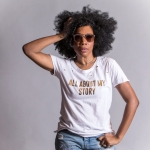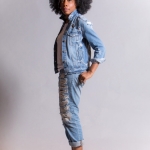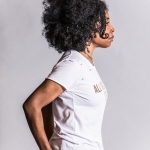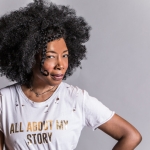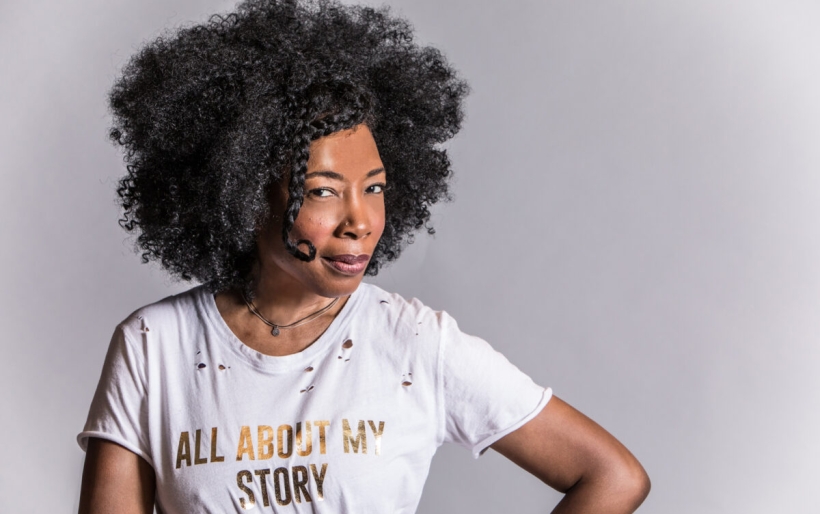
Donn T | photo by Josh Pelta-Heller for WXPN
The High Key Portrait Series: Donn T
“High Key” is a series of profiles conceived with the intent to tell the story of Philly’s diverse musical legacy by spotlighting individual artists in portrait photography, as well as with an interview focusing on the artist’s experience living, creating, and performing in this city. “High Key” will be featured in biweekly installments, as the series seeks to spotlight artists both individually and within the context of his or her respective group or artistic collective.
Donn Thompson Morelli is an author. She’s a theater and film actress. She’s a record label owner, having founded and launched Dtone Victorious records in 2014, on which she’s also a recording artist. She’s a singer and a songwriter who pens her own work and contributes to her husband’s as well, the Philly-by-way-of-New-York guitarist and producer Jake Morelli. She’s a committed multitasker and she doesn’t seem to want to stop.
These days she has her hands in a little bit of everything, from a new dreamscape of a collaboration with Philly rapper Chill Moody and producers Daru Jones and Ray Angry, to work with singer Kuf Knotz, to performing this past Spring in Prince Theater’s premiere of Japanese Azteroids, coming soon to Netflix. Earlier this month, Donn was a panelist and a headlining performer at a Behind The Song launch event, an anthology edited by K.M. Walton to which she contributed as well.
When you meet her, you get an immediate sense of just how busy she makes herself, how involved she is at every level of her artistry. What you notice most of all though is how hard a time she has keeping a lid on her exuberance for all of her many varied forays and interests.
Donn channels a rich family history in the arts, and in particular the arts in Philadelphia, and to spend half an hour asking her about it is to realize just how many more stories she’d have to relate if you only had another few weeks to talk. Raised in West Philly in the ‘70s by parents who were legendary performing artists in their own right, Donn and her brother Ahmir were both exposed from a young age to the power of wordcraft, and both followed their own distinct paths to prolific careers in the performing arts. She now goes by Donn T; her brother by Questlove — he started a band too.
DonnT talks about some of that here, and lays bare her reverence and gratitude for the eclectic influences with which she was imbued by her parents, and for the city that in her mind so uniquely and singularly supports such a variety of artistic style.

Donn T | photo by Josh Pelta-Heller for WXPN
THE KEY: You’re Philly born and raised, right?
DONN T: Exactly.
TK: Where did you go to high school, and what do you remember from that?
DT: I went to Girls’ High. From my freshman through junior year, my focus was academics. A freak accident, that landed me under a subway surface car on my way home from school one day changed the course of everything. Six weeks flat on my back gave me a lot of time to think and my world shifted. I transferred to the Philadelphia High School for Creative and Performing Arts for my senior year, and that really resonated with more of who I was. I wrote a song for my parents band that year.
TK: You wrote it specifically for them to sing?
DT: Sure. It was actually the second time I’d written for them. I was nine when I wrote my first song for their band, fifteen years old when I wrote the second. They recorded and released both. There was always music around the house. That was a given. It would sometimes happen that they’d be rehearsing and get stumped. I was the little writer in the family, you know. So, I’d come to the rescue. Lyrics, came very easily to me, ’cause I love words. They’ve always held a fascination for me — poetry and stories included.
I closely identify with being a singer-songwriter today but, it was only a matter of time before I entered the literary landscape. And absolutely freaky the way it happened. K.M. Walton, editor for the YA anthology Behind The Song, found an interview I’d written on-line and asked me to be a contributing writer. I am one of 14 authors (4 NYTers, 2 best sellers). My head spins every time I think of it. When the book hit Barnes and Noble in September, I went store to store to just see it on shelves. My names on the cover which is dope. Something about this year, I’ve been able to juggle it all. It feels fluid. It’s a cool feeling. Oh, and I’m writing another novel but, will being delivering music all the while. I hope I answered that — it was all over the place! [laughs]
TK: What do you remember about first getting connected to the Philly music scene?
DT: Well, frankly, I tell people this story all the time — I never remember NOT being connected to the Philly music scene, and it’s because music was always around the house. My first memories are: we were the loudest house on the block. I’m just amazed the police weren’t called. A couple days ago I was having this conversation with someone — I said, you know, I believe my family played music so loud, like at a certain decibel, that it was actually intimidating for our neighbors. I guess they figured, if we were that bold, to have music that loud, they better not confront us! We were that home. I grew up in West Philly. That was my earliest memory.
My dad had a band with my mom called Congress Alley — my late dad, he passed last year. I wasn’t around for the first incarnation of Lee Andrews & The Hearts which was the band that made him famous. However, the intricate harmonies and politically charged lyrics of Congress Alley had an effect on me. Growing up with stacks of records and all of that, that was also my first connection. The music that I was exposed to between the both of my parents was so diverse. My mom had a jazz and classical background being a tap dancer and a ballet dancer. And so all of that was around the house. My dad was a really strong country music fan — he loved Charlie Pride [laughs] and folks like that. He loved soul artists and blues artists as well, and gospel. So, you know, it was this soup. Early on, I really thought music was genre-less. I wasn’t aware of the separation. I just thought, ‘all of this is music.’ It wasn’t until I got probably into middle school that I realized that ok, people pick teams. There are groupings. But it was too late for me — in a positive way! [laughs] Because I was immersed in it all. And so today it informs my approach. I’m very difficult to categorize. I’m soulful in how I present but, you know, I’m hard to pin down.

Donn T | photo by Josh Pelta-Heller for WXPN
TK: Your dad was a singer — was your mom a singer also?
DT: My mom was a singer as well. She sang with him. She discovered her voice within their marriage. [laughs] But from [childhood] she was musical in that she was a dancer. She was one of the first hoofers — that was a form of tap dance in black communities — and she was taught by the greats to hoof, to tap dance, in a particular way — from the Four Step Brothers, and folks like that — they mentored her, in Pittsburgh.
TK: To reference an interview I heard with your brother last year, he mentioned that your dad wasn’t supportive of him going into recording hip hop — did you feel the same way about your parents’ support of your music aspirations?
DT: …OK, I actually have to say [laughs] — you talk to two siblings and they have a different opinion — so, pardon me if I contradict a little bit! My mom, Jacqui, was actually one-hundred percent supportive. My mom today knows more hip hop than the both of us. She is very connected and has always has been a real supporter, so Day One she was on-board. My dad, it took him awhile to catch up with what this was. He’s a singer! That was his lane. I think my being a writer intrigued him. Yet, he was a singer who closely identified with singing. I was a singer-songwriter that closely identified with writing. There isn’t a real divide but, it took him awhile to get my approach. And in fact — how ‘bout this — he grew up at a time where, you know, he’s standing on street corners, and there is no music, and he’s creating harmony. Regarding that, yes I agree with my brother. The whole MC concept — where a song is spoken, that was entirely lost on him for maybe a decade or more. But, he eventually caught up.
TK: So it wasn’t necessarily a discouragement of you guys going into the performing arts, but more so a discouragement of hip hop?
DT: Oh, no! Oh my dad expected us to go into the performing arts! [laughs] You know, for little awhile I thought I’d be a lawyer. I thought I had more interest in studying law than music. And most parents would be like ‘wow, that’s a great thing!’ [laughs] You know, he was a bit discouraged. [My dad’s] feelings were, who are these kids?! My brother didn’t show up in a way that translated. And my being a writer didn’t translate. My dad had a lot of street-smarts, [but] he didn’t complete high school. He was well-learned in that he studied what he didn’t know. He was a very bright, a brilliant man, but he didn’t have an inner confidence, and he didn’t feel very connected — even though he co-wrote some of his songs – to the written word. So his kids were choosing areas of expression where it’s like, what is this? [laughs] You know one is in a corner here with a paper and pen, scribbling and humming away, and the other is doing this thing called “hip hop,” which, what is that?
TK: It’s incredible how you both in your own ways translated your parents’ influence. When you think back on the Philly music scene, which artist(s) influenced you most?
DT: You know, Hall & Oates — there’s something about them. I like their early songs, their stories, the pairing. You know listening back, some of their lyrics were pretty controversial. [laughs] I think there was a time where you could sing about someone who was 16, and not be 16 — you can’t do that today! Now well, creepy. I love Jill Scott and — Santigold. She creates a different lane. Does it differently. That resonates with me.
TK: What do you remember from the first show you played in Philly?
DT: Let’s see.. My first-ever show in Philly, gosh.. Well it would’ve been with my parents. So that would’ve been somewhere around high school, the end of high school. The Spectrum maybe? And, you know, I enjoyed it, but when it’s the “family business,” it’s still the family business. You know, so it felt like, “I’m working for my parents” or with my parents, that sort of thing. But much later, I started a band on my own, and that would’ve been The Day — I had a band, a duo called The Day, and that resonated with me. Yeah it was thrilling. I remember that we played a barn — I don’t know where the barn was, it was somewhere in PA — and I remember thinking “this is cool, we’re gonna share our music in this barn,” and the response, it was so overwhelming that it just confirmed that, you know, I have a unique voice, and what I have to say lyrically is profound, because that’s what people were expressing.

Donn T | photo by Josh Pelta-Heller for WXPN
TK: What’s your favorite Philly venue to play and why?
DT: [laughs] …as I’m sitting in World Cafe Live! The main stage. [laughs]
TK: I know, people feel a lot of pressure here…
DT: You know, I haven’t played South but, I love going to see artists at South. It’s such a listening crowd. I like the Kimmel Center, I really enjoy playing “Sittin’ In” at Kimmel Center. I enjoy playing to audiences who are just very open, and they tend to have that sort of audience. Whatever you’re offering they’re down for, and I think that’s cool.
TK: The next one is maybe a bit of a thinker…
DT: [laughs] …oh yeah? It’s late in the day. So all of them are thinkers to me… [mocks] ‘what’s your favorite cereal?’ [laughs]
TK: What do you find that you love the most about having grown up in Philly as an artist?
DT: It’s always evolving! That’s not a thinker, no. It’s always evolving. That to me is what Philly is. You think you have it defined, and you trip over something new. You find these nooks of musicians and artists…it’s like it’s always renewing itself. I recently became aware of Shawn Smith…and I love that with Philly. You can recreate yourself as an artist, have fresh conversations with your fans. I love that it’s very easy to fall upon an artist, whose got a thing that’s absolutely developed, and crazy. And Philly makes you wonder where you’ve been — and you’ve been right here, watching! — but it’s just always emerging. That’s what I love most about it.
TK: What if anything do you find to be most frustrating about it?
DT: I think there is the perception that you have to be away from Philly in order for Philly to appreciate you. I think that may have been the case. I think something is changing. I suspect that there’s so much happening in our world that we’re all being forced to reconsider how we think. Things feel fragile. People are gravitating towards communities because there’s strength and comfort there. Folks are finding inspiration and safety in the immediate. Home is the immediate. Philly is home. Folks everywhere get that we need to appreciate what’s right in front of us because it isn’t a given, I think that idea’s filtering down into the music and creative scene in Philly. That’s what my perception is.
TK: How have you seen the city change, growing up here?
DT: [laughs] Oh my gosh, how have I seen my neighborhood change — I live in South Philly. Besides gentrification? We’re becoming more of a melting pot, that’s for sure. And I dunno, there’s just tons of new construction. It is actually overwhelming, it really is. I go to my old neighborhood [in West Philly] and I don’t recognize it, it’s a different place. I guess that’s Philly though, always changing its face.
- Donn T | photo by Josh Pelta-Heller for WXPN
- Donn T | photo by Josh Pelta-Heller for WXPN
- Donn T | photo by Josh Pelta-Heller for WXPN
- Donn T | photo by Josh Pelta-Heller for WXPN
- Donn T | photo by Josh Pelta-Heller for WXPN

